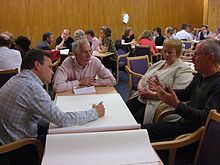User:Fbell74/sandbox

A World Café or Knowledge Café is a structured conversational process in which groups of people discuss a topic at several tables, with individuals switching tables periodically and getting introduced to the previous discussion at their new table by a "table host". A café ambience is created in order to facilitate conversation. In some versions, a degree of formality is retained to make sure that everyone gets a chance to speak.[1] Alternatively, the café concept can be taken more literally with everyone potentially talking at once. As well as speaking and listening, individuals may be encouraged to write or doodle on the tablecloth so that when people change tables, they can see what previous members have written as well as hearing the table host's view of what has been happening.
The World Café originated at the home of Juanita Brown and David Isaacs in 1995 when a "large circle" conversation became disrupted by rain.[2]
In the version used by David Gurteen (who uses the term "Knowledge Café"), the small group discussions are not led by a facilitator, and no summary is captured for subsequent feedback to the group - the aim is to maximise time spent in conversation and so time spent with one person presenting is minimised.[3]
World Cafés have been used by a range of organizations.[4][5][6][7][8][8][9][10][11][12][13][4][14][15][16][17][18][19] [20][21][22]
See also
- Joscha Remus, founder of the first Knowledge Cafe in Germany, in 2007
References
- ^ Slocum, Nikki. Participatory Methods Toolkit: A Practitioner's Manual Section: "Method: The World Café". A joint publication of the King Baudouin Foundation and the Flemish Institute for Science and Technology Assessment (viWTA). ISBN 90-5130-506-0
- ^ The World Café. "History".
- ^ Gurteen, David (2003 to 2008). "How to run a Knowledge Café". Gurteen. Retrieved 15 February 2017.
{{cite web}}: Check date values in:|date=(help) - ^ a b Peter M. Senge (31 March 2010). The Fifth Discipline: The Art & Practice of The Learning Organization. Crown Publishing Group. pp. 362–. ISBN 978-0-307-47764-4.
- ^ "World Café Powerpoint". www.democraticdialoguenetwork.org. UNDP. Retrieved 16 December 2014.
- ^ Cite error: The named reference
Holman2009was invoked but never defined (see the help page). - ^ Dunn, J P (Aug 2004). "Making Stakeholder Engagement Work" (PDF). Australian Water Association. Retrieved 15 December 2014.
- ^ a b Margaret J. Wheatley; Deborah Frieze (11 April 2011). Walk Out Walk On: A Learning Journey into Communities Daring to Live the Future Now. Berrett-Koehler Publishers. pp. 192–. ISBN 978-1-60509-733-6.
- ^ Jay Liebowitz; Michael Frank (8 November 2010). Knowledge Management and E-Learning. CRC Press. pp. 174–. ISBN 978-1-4398-3726-9.
- ^ Cite error: The named reference
D'SouzaRenner2014was invoked but never defined (see the help page). - ^ Stern, Townsend, Rauch, Schuster, Thomas, Andrew, Franz, Angela (2013). Action Research, Innovation and Change Across Disciplines:: International Perspectives Across Disciplines. Routledge. ISBN 9781317916079. Retrieved 15 December 2014.
{{cite book}}: CS1 maint: multiple names: authors list (link) - ^ Marilyn H. Oermann PhD, RN, FAAN (26 August 2007). Annual Review of Nursing Education, Volume 6, 2008: Clinical Nursing Education. Springer Publishing Company. pp. 53–. ISBN 978-0-8261-1084-8.
{{cite book}}: CS1 maint: multiple names: authors list (link) - ^ Burke, Sheeldon, Cathy, Keeley. "Encouraging workplace innovation using the 'World Café' model". Nursing Management. 17 (7): 14–19. doi:10.7748/nm2010.11.17.7.14.c8055. Retrieved 15 December 2014.
{{cite journal}}: CS1 maint: multiple names: authors list (link) - ^ Spencer William Buckland (2008). Transforming Leaders and Culture. Royal Roads University (Canada). ISBN 978-0-494-35419-3.
- ^ "Parent Cafe Training Institute" (PDF). www.cssp.org. www.bestrongfamilies.net. Retrieved 5 January 2015.
- ^ "What we do". www.nochildabuse.org. Child Abuse Prevention Council of San Joaquin County. Retrieved 5 January 2015.
- ^ "Parent cafe and Library". www.international-montessori.org. International Montessori Schools. Retrieved 5 January 2015.
- ^ "Parent Cafe for parents of LGBTQ Jews". www.keshetonline.org. Keshet. Retrieved 5 January 2015.
- ^ J. Jacob Jenkins (22 November 2013). The Diversity Paradox: Seeking Community in an Intercultural Church. Lexington Books. ISBN 978-0-7391-8352-6.
- ^ Bruce Sanguin. The Emerging Church: A Model for Change & Map for Renewal. Wood Lake Publishing Inc. pp. 75–. ISBN 978-1-77064-299-7.
- ^ Anna DiStefano; Kjell Erik Rudestam; Robert Silverman (6 November 2003). Encyclopedia of Distributed Learning. SAGE Publications. pp. 80–. ISBN 978-1-4522-6523-0.
- ^ Gyllenpalm, Bo. "Connecting diverse people and ideas: A virtual knowledge cafe" (PDF). www.theworldcafe.com. www.theworldcafe.com. Retrieved 15 December 2014.
Further reading
- "The Knowledge Café–A Knowledge Management System and Its Application to Hospitality and Tourism". Journal of Quality Assurance in Hospitality & Tourism. Volume 3, Issue 3-4, 2002. pp. 75-88.
- The Complete Guide to Knowledge Management. John Wiley & Sons. pp. pt112–114.
- The World Café. Berrett-Koehler Publishers. pp. 96-98.
- ICIE 2015 3rd International Conference on Innovation and Entrepreneurship. Academic Conferences Limited. pp. 191–193.
- The Future of Knowledge. Routledge. pp. 146–148.
- Capitalizing on Knowledge. Routledge. pp. 125–.
- Powerful Professional Development. Corwin Press. pp. 83–.
